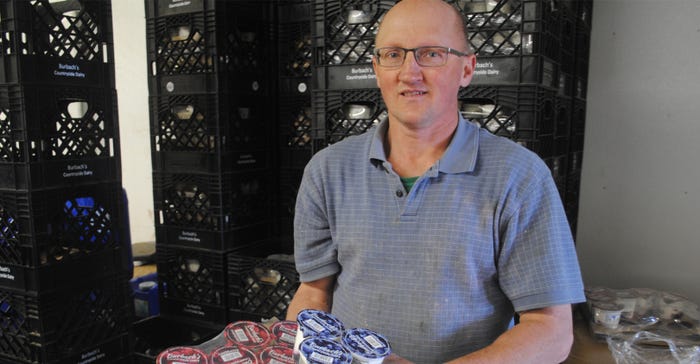
Dean Burbach loves a good challenge. Maybe that's why he and his wife, Lisa, are dairy farmers. The Hartington, Neb., family milks about 170 Holstein and Jersey cows — the same number of cows they have milked for many years.
But they have been able to find their niche in the competitive dairy market, not by expanding cow numbers, but by providing a unique product line marketed directly from their farm that loyal customers can identify with. Along the way, the family has had to innovate and invent their own processing systems, marketing strategies and delivery models to build their farm into a successful dairy business.
"If I had to say what is the most rewarding part of what we do, it would probably be the challenges," Dean Burbach says. "Seeing challenges and figuring out a way to overcome them in the end is very rewarding."
Burbach's Countryside Dairy now produces, processes, bottles and delivers its own fluid milk to grocery stores, ice cream parlors and coffee shops in nearly 30 cities and towns in Nebraska, South Dakota and Iowa. They have a strong presence in Lincoln, Omaha, Sioux Falls and Sioux City, along with rural towns in between.
Milk flavors not only include skim, 1%, 2% and whole, but also chocolate, strawberry and the ever-popular root beer. Dean and Lisa rotate special featured flavors throughout the year, such as banana, blue raspberry, caramel latte, orange cream and cotton candy.
But the milk flavors aren't the only aspect of the product line that makes Burbach milk unique. They market their milk in returnable glass bottles.
"When we started marketing our own milk, we knew we couldn't compete in the regular marketplace," Dean says. "We wanted to do something different and unique. The glass bottle milk seems to stay colder longer and preserves the fresh taste.”
Returnable glass bottles also are environmentally friendly, saving plastic milk bottles that are wasted, he adds. Freshness also counts, because Burbach Dairy delivers milk to the grocery store shelves within 24 to 48 hours of being produced by its cows.
After perfecting their processing and delivery system over the years, Dean and Lisa made plans to expand into the yogurt product line.
"It is definitely a crowded market for yogurt," Dean says. "But we felt that our loyal milk customers would be interested in another wholesome product from our dairy like yogurt. If they found our milk in the dairy cooler in the grocery store, we could place a sign there and point them to our new yogurt line."
Burbach Dairy strategically planned its yogurt marketing for a launch last summer, preserving its same, simple design for the yogurt products. As they began work on the yogurt line, Lisa made small batches of yogurt to test their flavors and processing, gradually making larger batches and experimenting until they got the high-quality product they wanted.
Dean's brother David, who lives in Wisconsin, also has assisted in the launch of the new products and in acquiring the processing equipment needed for the operation.
They offer four flavors, including vanilla, strawberry, raspberry and blueberry. "We tried to be unique from other yogurts on the market by packaging our yogurt in a clear container," like our glass bottled milk, Dean says. "Instead of mixing the fruit into the yogurt, we place it in the bottom of the container, with the yogurt on top. This allows our customers to see the fruit in the container and to mix it up themselves."
After a year of marketing, their yogurt sales keep expanding.
For Dean and Lisa, it has been a long, sometimes difficult journey to get where they are today. Dean graduated from the University of Nebraska with an engineering degree. After they were married, they eventually built their milking parlor in 1999, literally on a string and a prayer.
But over time, Dean's engineering degree has come in handy, allowing him to tinker with milk bottling and yogurt packaging equipment to make these complex machines adaptable to the operation and to work more efficiently in their own situations.
When they first started processing their own milk, the family wisely built an additional room adjacent to the bottling equipment. Today, that room has been converted into an area for milk bulk tanks and yogurt processing.
The couple also has benefited from having their seven children involved in varied aspects of the operation, including milking, processing and deliveries. Two sons continue to work for the dairy.
The Burbachs started out with Holstein cows, and continue to milk Holsteins, but they also have added Jersey cows to their herd because of the additional butterfat Jersey milk provides.
While Dean and Lisa and their family members are well-versed on herd health and the regular operations of the dairy, they also are knowledgeable and passionate about their product lines and their marketing. This knowledge has allowed the farm to grow its sales an average of 11% annually.
"In the end, the challenges of getting things done are what I truly enjoy," Dean says. A new product line of yogurt has provided new challenges for Burbach Dairy, but it also is providing the family with opportunities to reach new customers.
In a time when many dairy farmers are struggling to survive, the Burbach family has been able to stabilize their income through the marketing of their own products. Learn more about the Burbach family and their dairy products at burbachscountrysidedairy.com.
About the Author(s)
You May Also Like






